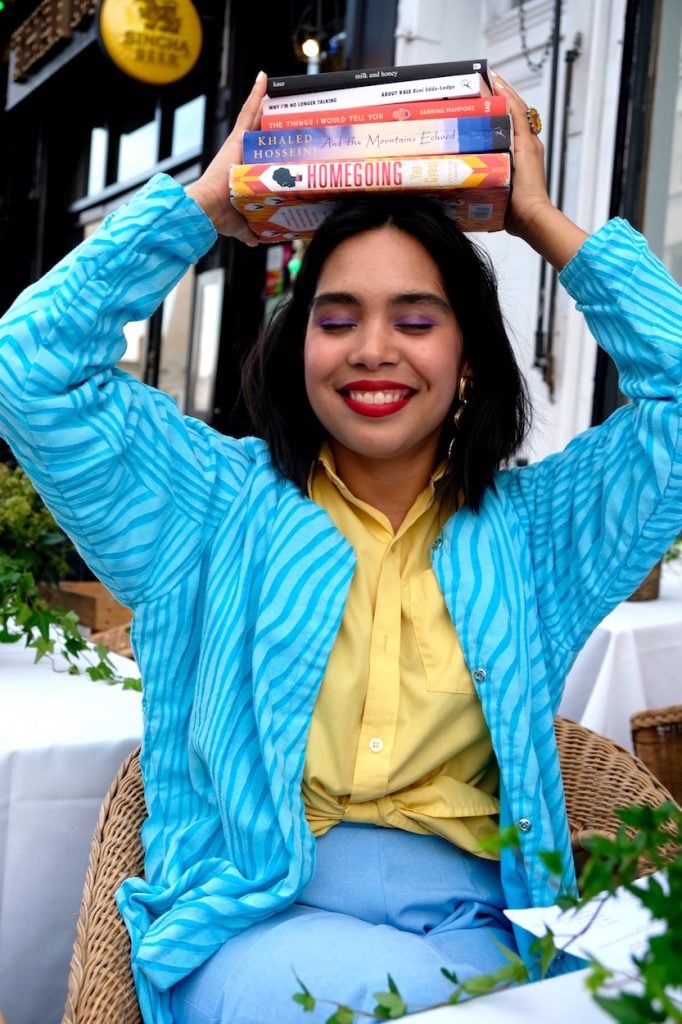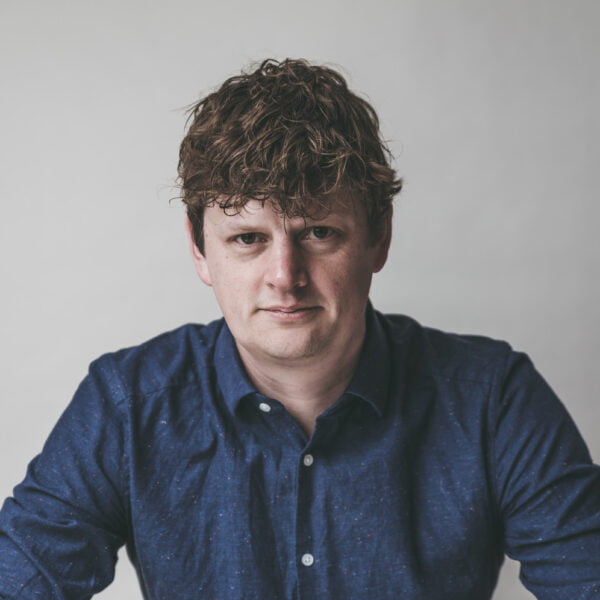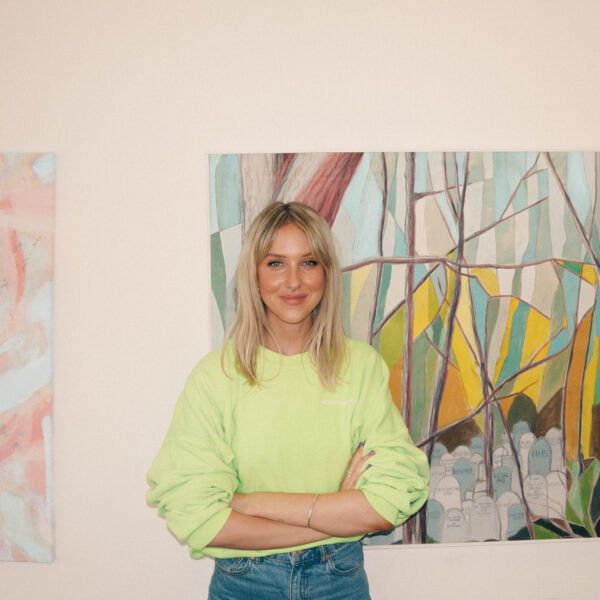
Natasha Collie
Senior Brand Marketing Manager at Penguin Random House UK
At the start of the year, Ladybird Books approached Sonder & Tell with a dream brief. In 2021, a year that’s been particularly challenging for...
In conversation with
Editor-in-Chief at XXY Magazine, freelance journalist

Tahmina Begum is an absolute force. The Editor-in-Chief of XXY Magazine is always buzzing with conversation, fizzing with ideas and dressed in colours so bright you’ll need to turn saturation levels down.
In her own words Tahmina is #BadandBengali and she regularly shares stories of her South Asian heritage (likes this piece on women eating during Ramadan while they’re on their period, and this on being in an interfaith relationship). “I always say my own voice is just a mirror of those who have not been afforded the pen or mic to shine a light on their own lives”, Tahmina says. When we met up with the writer she called her books her babies and then leant us half of them, which is pretty much her generous, curious mind summed up.
They always tended to be those who were underrepresented and disenfranchised somehow from society and life. This isn’t to glamourise the underdog – because when you are the underdog it can be awful – but I always say my own voice is just a mirror of those who have not been afforded the pen or mic to shine a light on their own lives.
Okay so Jacqueline Wilson is literally the reason why I became a writer. It’s something I’ve known I wanted to do since I was 4 but at 7, she cemented it for me through her book Double Act. Tracy Beaker was great but it wasn’t as good as titles like Dustbin Baby or The Lottie Project – books about those who didn’t come from picture-perfect backgrounds and girls who were seeking something inside them.
The book that got me into university was Princess by Jean Sasson, a real life telling of a Saudi Arabian princess. It was so honest and real and balanced. Books about the Middle East or anyway inclined towards Islam, I’m always sceptical about and really do look at who wrote and published it. But this book, though I have only read it once, showcased privilege and repression in such a candid light.

XXY Magazine was founded in 2012 by the great stylist and creative director Ib Kamara (I was his first fashion features writer). It was produced in a time in which binary gender wasn’t prescribed when it came to discussing fashion, design and culture. It has always had a focus on emerging creatives and highlighting diversity before those all became buzzwords and mainstream media caught up. It’s changed over the years but it really is a hub of inclusivity and being open.
“XXY has always had a focus on emerging creatives and highlighted diversity before it became a buzzword”
This gal-dem piece I wrote a year ago about what it is like to sound white always tends to resonate with people or my interfaith piece for Oh Comely. I really enjoy writing about the internet but how it affects the offline and our problematic behaviour around it i.e my pieces on ‘dragging’ and ‘cancelling’ culture.
I wrote a piece recently for HuffPost UK about how Muslim women shouldn’t feel ashamed for eating in front of their friends and family during ramadan (because if you’re doing that in the day it indicates you’re on your period and communities all over the world are scared about discussing women and their blood). That was received really well and many Muslim women thanked me -which was the extra cherry on top. As well as of course representing South Asian narratives which let’s be honest, gets forgotten about even when companies and brands ‘seek’ variety.


This has become such a cliche but I don’t care cause he’s the best: A Thousand Splendid Suns by Khaled Hosseini is one of my favourites, along with Audrey Niffenegger’s The Time Traveller’s Wife. I have read those two countless times and learn something new about whatever’s happening in my life through their incredibly crafted words. Other writers I love are Meg Wolitzer – The Uncoupling is the first title I read of her a few months ago and I’m mad I’ve been missing out on her. She writes in such a simple but nuanced way that reflects how layered and contradictory people are.
I’ve also been reading Without Reservations: The Travels Of An Independent Woman by Alice Steinbach. I really have felt touched by her as I became full-time freelance about a year ago and there’s a line in the book where she says: “I had fallen into the habit of defining myself in terms of who I was to other people and what they expected of me”. That truly resonated with me.
Of course, Why I’m No Longer Talking To White People About Race by Reni Eddo-Lodge has to have an honorary mention. About time someone laid it out so simply and acutely.
The Things I Would Tell You: British Muslim Women Write edited By Sabrina Mahfouz is the best anthology of poems, news, stories, fact and fiction I have ever come across. And that’s saying something because short stories and anthologies are what I fall back on whenever I’m feeling curious and don’t want to read fiction, which at the moment is 75% of the time.
But the book I recommend the most is Homegoing by Yaa Gyasi. My god, if you ever wonder about the African American experience and how layered it is then read this beautiful book. It really made my heart have a moment when I put it down.

I’m sad to say I haven’t. I’ve only really ever read My Kind Of Girl by Buddhadeva Bose and translated by Arunava Sinha. I need to find more Bengali writers but because that’s lacking in my life, I’m working on a special project at the moment that is going to try to bridge that gap.
As I like to say, I’m 100% #BadandBengali. I’m so lucky that though I went to majority white schools, I grew up with parents and a huge extensive family that taught me about history, language, food, the humour – everything! I think people have the biggest problems with their identity when they don’t know where they come from or they don’t know much but then they have to go through all the trials and tribulations of life that comes with having either that skin tone or identity pressed onto you.

I love Riposte Magazine, Printed Pages, of course gal-dem have been great and pushed for a space women of colour have been so deserving of for such a long time. But honestly, I think at the moment, the market is saturated with a diversity of thought but doesn’t really cater to genuine diversity. It’s still very surface.

Bad Feminist by Roxane Gay. If you know, you know.
Tahmina's Storylist

Senior Brand Marketing Manager at Penguin Random House UK
At the start of the year, Ladybird Books approached Sonder & Tell with a dream brief. In 2021, a year that’s been particularly challenging for...

Founder Of Simple Politics
Talking about serious issues doesn’t mean defaulting into a serious tone of voice, or using complicated language. If anything, accessibility, clarity and a touch of...

Brand & Community Manager at Homethings
Creating a tone of voice from scratch can be challenging. But a blank slate to work from also mean there’s room for something a bit...

freelance energy and culture journalist

Features Editor at RED Magazine, founder Conversations on Love